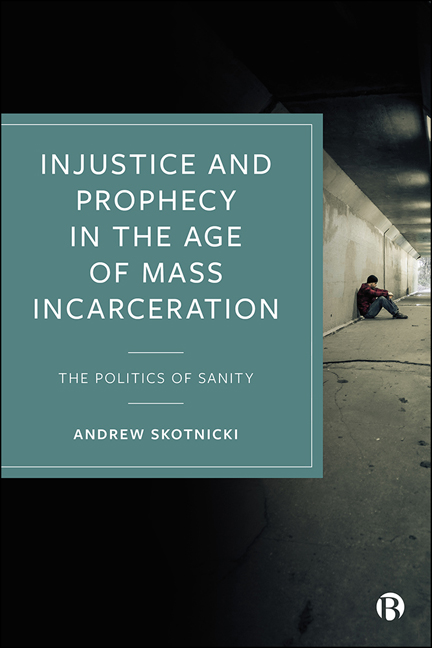5 - Prophetic Types and the Penal Sanctuary
Published online by Cambridge University Press: 12 October 2022
Summary
We have spoken repeatedly of prophets in these pages in both their voluntary and involuntary guises. In this chapter we will elaborate upon these two expressions. We will first speak of the voluntary prophets and their radical ministrations against skewed opportunity and the detention of the threatening in a culture dominated by the fear, projection, and victimization of its “partial citizens” and “internal exiles.” Since, in the last chapter, our profile of the prophetic character was largely a synopsis of the voluntary prophet, our remarks in this area will be rather brief and amplify the courageous witness of some imprisoned prophets. We will then proceed to analyze the involuntary prophets whose inability to bear the heavy cloak of necessity, as alluded to in our discussion of Kierkegaard, so often creates an alternate reality that is as much colored by internal/religious intimations as it is by fanciful illusion. That exposition will then be followed by discussing a synonym for the prison that, by now, should strike the reader as most apropos. More and more, our detention facilities have become the sanctuaries of the prophets.
The voluntary prophet: determination to speak the truth despite fierce opposition
There are those in this world who are blessed and burdened with a deep sensitivity to issues pertaining to justice, fairness, and equal regard, particularly for those whose lives are in daily peril. Furthermore, they are moved by an unknown force to relinquish their reluctance to sacrifice personal desires for security and comfort, even to cling tenaciously to their very lives, in fidelity to what can be depicted in no other way than an inner fire. This prophetic flame cannot be quenched unless the appointed person speaks and acts on behalf of those whose immeasurable worth has been distorted and whose lives are perceived to possess no social value. Such persons are what I am calling voluntary prophets. As Brueggemann attests, they resist “totalism”: those systemic practices and constraints that seek to eliminate critical retort or intrusion. They are, as we discussed in the last chapter, inevitably at the very edge of the “inside,” in the ghettos and jails from which they find a ground “to think the unthinkable, to imagine the unimaginable, and to utter the unutterable.”
- Type
- Chapter
- Information
- Injustice and Prophecy in the Age of Mass IncarcerationThe Politics of Sanity, pp. 121 - 132Publisher: Bristol University PressPrint publication year: 2022



